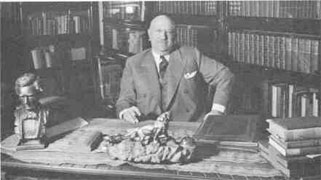Horner's style fueled his popularity
 |
STATE CAPITOL BUREAU Henry Horner's common touch made him Illinois' most beloved governor ever - despite battles with the lieutenant governor, fellow Democrats, Depression-era financial pressures, and his own loneliness. |
Horner had been a probate judge in Cook County for 18 years when, with the backing of Chicago Mayor Anton Cermak, he ran for governor in 1932. His victory made him Illinois' first Jewish governor and the first governor to be born in Cook County.
At his inauguration speech, Horner asked the legislature to end the partisan squabbling that had delayed legislation to solve the social and economic problems of the Depression.
He then snubbed Cermak by appointing men he thought would be best for the job rather than loyal Democrats. Cermak was assassinated in Florida two months after Horner became governor, but Horner didn't get along any better with the next mayor, Edward J. Kelly.
After ratification of the 18th Amendment to the U.S. Constitution, which ended Prohibition, Horner fought to have the state regulate all liquor sales to keep politics out of the saloons. Kelly deadlocked the legislature, insisting on local control of liquor licenses.
In 1933, Horner began to receive complaints from Washington that Illinois was contributing less to relief than other states with high unemployment.
In fact, 99 percent of the $68 million spent on relief in Illinois came from the federal government.
Horner raised $30 million in a bond issue, but the money was gone in a year. He needed a more steady income for the state.
Out of necessity, Horner fathered the Illinois sales tax.
 In his first attempt, Horner rammed a 3 percent tax though the legislature. The Supreme Court declared the tax unconstitutional because it excluded farm products and motor fuel. He reduced the tax rate to 2 percent, took out the exemptions and tried again. After two cliffhanger roll calls, it passed. This time the Supreme Court concurred.
In his first attempt, Horner rammed a 3 percent tax though the legislature. The Supreme Court declared the tax unconstitutional because it excluded farm products and motor fuel. He reduced the tax rate to 2 percent, took out the exemptions and tried again. After two cliffhanger roll calls, it passed. This time the Supreme Court concurred.
Horner's name had become known statewide before his governorship - he was the keynote speaker at the Democratic state convention in Springfield in April 1928.
Yet when he lived in the Executive Mansion, he was often lonely, being a bachelor with no close family in Springfield.
According to "Horner of Illinois," a biography of the governor written by Tom Littlewood and published in 1969, Horner forged a friendship with James A. Griffin, the Roman Catholic bishop of Springfield at the time.
On "many a lonely night," the book states, they would meet at the mansion, and "in the company of a bottle of Old Belmont bourbon, which they jointly admired, the Jewish governor and the Catholic bishop talked politics, theology, and life into the small hours."
"Horner never failed to send poinsettias at Christmas, lilies at Easter, and gifts on the bishop’s birthday."
Horner also liked to play poker with political cronies at the mansion until early morning hours. He ate well, despite high blood pressure. He loved to lose himself in movies. And he loved children.
"He never missed an opportunity to remind friends that their children represented the only genuine treasures of life and that they should never lose sight of this," Littlewood wrote.
"Circuses and children go together," the book added, "and Henry Horner loved both. Whenever the big top came to town, the governor passed the word through the appropriate channels that any child who did not have the price of a ticket should meet him at a certain gate. He always bought tickets and refreshments for the gang."
Horner's support for New Deal reforms pushed by fellow Democrat Franklin D. Roosevelt in the White House helped make his time in office a time of great change.
"Many downstate Democrats wanted Horner to play down the social reforms of the New Deal," the book states. "In spite of his troubles with Washington, the governor believed fervently in what the New Deal was trying to do and never faltered in his devotion to Roosevelt's objectives. He corresponded regularly with the president's wife (Eleanor Roosevelt), whom he admired."
Horner literally worked himself to death during his second term in office. He suffered coronary thrombosis and thereafter conducted all of his official business from his bedroom.
Though his health was failing, he refused to resign. He didn't want his lieutenant governor, John H. Stelle, to get the top job. So when Horner had to withdraw from a run for re-election due to his failing health, he backed another Democrat, state Democratic Chairman Harry Hershey of Taylorville, for the party's nomination.
Hershey beat Stelle by more than 330,000 votes in the primary. But after Horner died on Oct. 6, 1940, Stelle took over the governor's job for 99 days until the Republican who defeated Hershey, that November, Dwight Green, took over.
"Henry Horner was the Real Goods," famed poet Carl Sandburg told Littlewood in 1961. "He collaborated with men who were purchasable without becoming purchasable himself. He got to high places without selling his soul."
